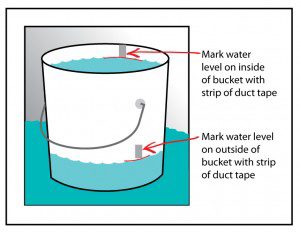Some Factors Which May Affect Your Bucket Test Results:
- Wind Factor: If there is a wind, the sides of the bucket will protect the water inside it, meaning less water evaporates in the bucket that it will in the pool.
- Water Cooling: The water in the bucket might also cool faster than the pool; since the pool has a constant supply of warmer water rising from the bottom it. Again, that may result in less evaporation of the water in the bucket.
- Surface of the Water: The surface of the water in the bucket is more stable than the pool, meaning once again – less evaporation on the bucket.
- Overfilling: Overfilling the pool can result in unnecessary damage to the ground under the deck or pavers. Skimmers do not have a watertight seal on the top and the water can seep through that space. Some pools are equipped to automatically drain and self-adjust to the normal level (mid skimmer) when overfilled.
- Rain: Rain will also produce the same results as overfilling. Do not begin your monitoring process until your water is at the normal level (mid Skimmer). You should not take your measurement unless you have a rain-free 24 hour period.
Below we have also included some helpful tips that will assist you to keep your pool in its top operational state and reduce the cost of your operating expense.
- Be sure to perform leak detection test on a regular basis. A leak in the pool can waste up to 1,000 gallons of water per day and raise your water bill significantly.
- Be sure to monitor your automatic filler. If it is not operating efficiently, your money is just going down the drain.
- Be sure to keep track of the amount of chemicals you are using. If you are using more chemicals to compensate for fresh water, you may have a leak.
- A pool cover or solar blanket will also reduce heating costs.
Bucket Test
A Bucket Test is the old way to determine if your pool is actually leaking.
If you suspect your pool may have a leak CALL US FOR ACCURATE POOL LEAK TEST.
DIY: How to Do the Bucket Test

- Bring the pool water to its normal level
- Fill an empty bucket with pool water to about one inch from the top of bucket. (By filling the bucket close to the top you are ensuring that air movement over the surface of the bucket will similar to that of the pool.)
- Place the bucket on the first or second step of the pool. To keep it from floating away it may be necessary to place a few bricks or rocks into the bucket. (By placing the bucket in the pool water you are ensuring that the water temperature of each will be similar).
- Mark the water level inside the bucket.
- Mark the water level of the pool on the outside of the bucket, on the pool wall, or skimmer face plate.
- Operate the pool for 24 hours as it had been operated when a leak was first suspected.
- After 24 hours, compare the two levels. If the pool water (outside mark) goes down more than the inside water level, there is probably a leak.
Calculating the gallons of water lost from you pool
To more effectively visualize the leak or leaks you have it will be helpful to translate inches of water lost into gallons of water leaking. First subtract the bucket loss from the pool loss. The result will be inches of water lost due to leaks. Next calculate the square footage of the water surface of your pool. Then enter these results into the following equation:
Inches of water lost x Area of Pool Surface (in square feet) x .62 gallons
Visualizing the actual size of your leak is easier and as you can now translate this number into gallons of water lost per hour or per minute. You may also find it valuable to calculate how much you are spending on chemicals or for that matter water to re-treat or replace the water that has leaked from the pool.
As always, Certified Pool Leak Inspections is glad to take care of pool servicing needs. If you suspect your pool is leaking, in need of maintenance, or any other type of repairs, don’t hesitate to contact us for a quote or estimate at: (561) 542-0686.
We are glad to serve our community!
Check our services here or contact us.
More from Certified Pool Leak Inspection:
- Strengthening Family Ties In The Age of Technology With a Beautiful Backyard Pool (Among Other Benefits)
- Most Common Types of Pool Repairs In South Florida
- What Causes Pool Leaks In South Florida?
- Getting a Leak Detection vs. Getting a Pool Inspection
- Pool Leak Professionals: Keep Developing your Professional Skills





